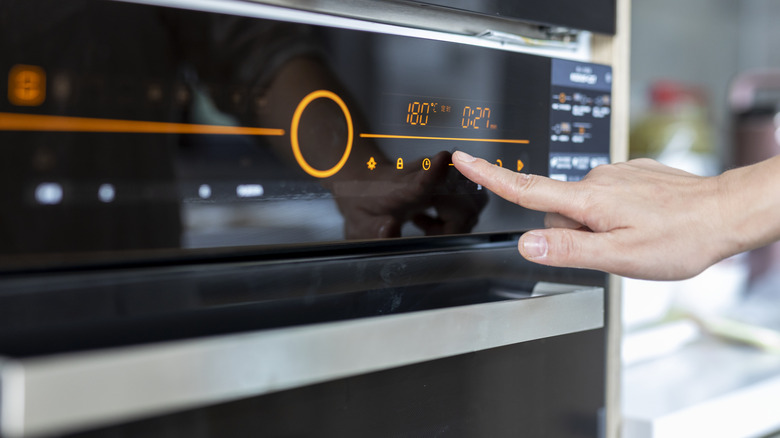How A Self-Cleaning Oven Actually Works
Though it isn't a feature people use often, some ovens come equipped with a button labeled "self-clean." If you're not familiar with this function, no, little magical gnomes don't come out of nowhere and start scrubbing off the layers of oil and grime in your oven once you press it. Instead, your oven door will automatically lock, and your oven will start blasting the heat, some going all the way up anywhere between 800 to 900 degrees Fahrenheit. The door locks for safety purposes; when the cycle is complete and the oven cools down to a safe temperature, it'll unlock on its own.
The high heat incinerates the errant chunks and residues inside your appliance and turns them into soot or ash, which ideally makes cleaning easier. As you can imagine, this process can emit a fair amount of smoke, so you'll want to make sure your oven's vents aren't obstructed, and it's best to open the windows and doors just to let the smell out. Nobody wants furniture or carpet that smells like burnt food! You'll then be able to simply clean out the oven using a rag and some light cleaning solution rather than an oven spray. Oven cleaning sprays can be quite caustic, releasing fumes and potentially even causing chemical burns.
Make sure your oven is totally empty before running the self-clean cycle
Always check your oven's manual before running the self-cleaning cycle. But regardless of specifics, there is one thing you'll absolutely need to remember to do: empty the oven. When I say empty the oven, I mean take out everything. You don't want any loose pans in there; who wants to be stuck scraping melted plastic from your oven? You'll even want to remove the oven racks, which will need to be scrubbed down manually. That way the self-cleaning cycle won't potentially damage other components of the appliance, and the inner surface area will get the most potential out of all that high heat.
Again, not all ovens have a self-cleaning cycle (mine certainly doesn't). So there are other ways to clean your kitchen's workhorse, including conventional cleaners and using lemons to clean your oven. It is a good idea to clean your oven regularly, especially if it gets a lot of use, so don't forget to give this invaluable kitchen tool as much attention as you do the stovetop. It is considered a food prep area, and you don't want to be cooking your food in a grimy box anyway, right?

